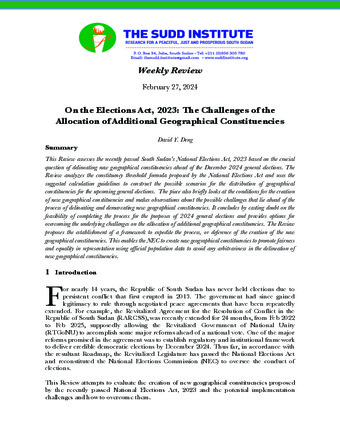On the Elections Act, 2023: The Challenges of the Allocation of Additional Geographical Constituencies
Publication Summary
This Review assesses the recently passed South Sudan’s National Elections Act, 2023 based on the crucial question of delineating new geographical constituencies ahead of the December 2024 general elections. The Review analyzes the constituency threshold formula proposed by the National Elections Act and uses the suggested calculation guidelines to construct the possible scenarios for the distribution of geographical constituencies for the upcoming general elections. The piece also briefly looks at the conditions for the creation of new geographical constituencies and makes observations about the possible challenges that lie ahead of the process of delineating and demarcating new geographical constituencies. It concludes by casting doubt on the feasibility of completing the process for the purposes of 2024 general elections and provides options for overcoming the underlying challenges on the allocation of additional geographical constituencies. The Review proposes the establishment of a framework to expedite the process, or deference of the creation of the new geographical constituencies. This enables the NEC to create new geographical constituencies to promote fairness and equality in representation using official population data to avoid any arbitrariness in the delineation of new geographical constituencies.
David Y. Deng is pursuing a Master of Public Policy and Management at Strathmore University, Nairobi, Kenya. He holds a bachelor’s degree in actuarial science from the University of Calgary, Alberta, Canada. David Y. Deng has several years of work experience in project operational management in the humanitarian sector. He is a certified Project Management Professional (PMP).

